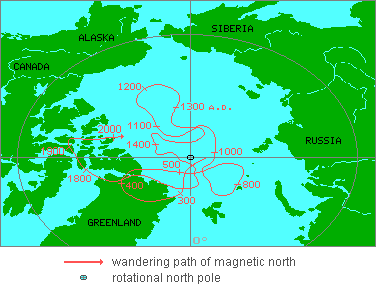This interesting phenomenon is a boon for archaeologists and geologists due to a principle called remnant magnetism. When magnetic iron-bearing minerals crystallize or when they settle slowly out of a liquid medium, individual mineral grains align themselves with the existing magnetic field of the earth. Over long periods of time, when new minerals are deposited, the alignment changes as the pole moves. By measuring polarity, variations in intensities, and changes in inclinations through a sequence of sediments or rocks, researchers can reconstruct paleomagnetic history.
 This shows how the north magnetic pole has moved over the last couple of thousand years. This reconstruction is a benefit to archaeologists, as heating soils to high temperatures causes their mineral grains to change their remnant magnetism to the pole alignment at the time of the heating. Through a technique called archaeomagnetic dating the inclination of mineral grains in clays from ancient firepits or kilns, can be compared with the known "track" of the pole and a date derived. This technique is not used as much as radiocarbon as it is an exacting process to gather the soil samples - a specialist has to come visit your site to do it. It is much easier to take carbon samples and mail them in to a lab. But it is a good fall-back technique.
This shows how the north magnetic pole has moved over the last couple of thousand years. This reconstruction is a benefit to archaeologists, as heating soils to high temperatures causes their mineral grains to change their remnant magnetism to the pole alignment at the time of the heating. Through a technique called archaeomagnetic dating the inclination of mineral grains in clays from ancient firepits or kilns, can be compared with the known "track" of the pole and a date derived. This technique is not used as much as radiocarbon as it is an exacting process to gather the soil samples - a specialist has to come visit your site to do it. It is much easier to take carbon samples and mail them in to a lab. But it is a good fall-back technique.
Geologists use paleomagnetic studies for dating purposes, but also have used the techniques to map continental drift. One aspect of paleomagnetism that has fascinated me since I took Geology 112 at Tulane, is that numerous times in the past the poles have done more than just wander - they have reversed positions entirely. A compass needle would have pointed north at some times and south at others. Geophysicists have been able to document more than 400 polarity reversals over the last 330 million years.  This graph shows the polarity reversals over the last 4 million years. Average interval between reversals is about 700,000 years, though the standard deviation is high. Looking at this chart you can see the last one was about 800,000 years ago - so we're due.
This graph shows the polarity reversals over the last 4 million years. Average interval between reversals is about 700,000 years, though the standard deviation is high. Looking at this chart you can see the last one was about 800,000 years ago - so we're due.
What would a polarity reversal due to our civilization? Compasses would be the least of our worries - what would the effect be on generators or electric motors for example? Supposedly the reversal events occur over periods of hundreds or even several thousand years, but it's hard to imagine what a transitional period would be like. We conceive of polarity as a binary phenomenon. Maybe a geophysicist out there can explain it to us.
I've thought for many years that a polarity reversal should join an asteroid strike on our planetary worry list. What do you think?
2 comments:
Reid, I'm glad you took on this subject. I've already been worrying about it for a long time. It seems to me that something very large and subtle is happening to the whole planet -- but maybe that's just because we see crust events so vividly via the media. I'm just so very conscious that we've done a lot of things in the last ten thousand years that could be undone much more quickly.
Prairie Mary
It's interesting, but I have NEVER read anything in the popular press that talks about polarity reversals - even this one about the wandering pole doesn't mention that. Yet you read a couple or three pieces a year about asteroid strikes. Compare the timing: the last asteroid or major meteorite was Chixculub at about 60M years ago. We have had all these reversals in the last 4M years.
I doubt that they mean anything to animals or primitive humans - although there has not been one since we have been a species. But we should seriously think about what the effect would be on everything electronic that we depend on now.
Post a Comment